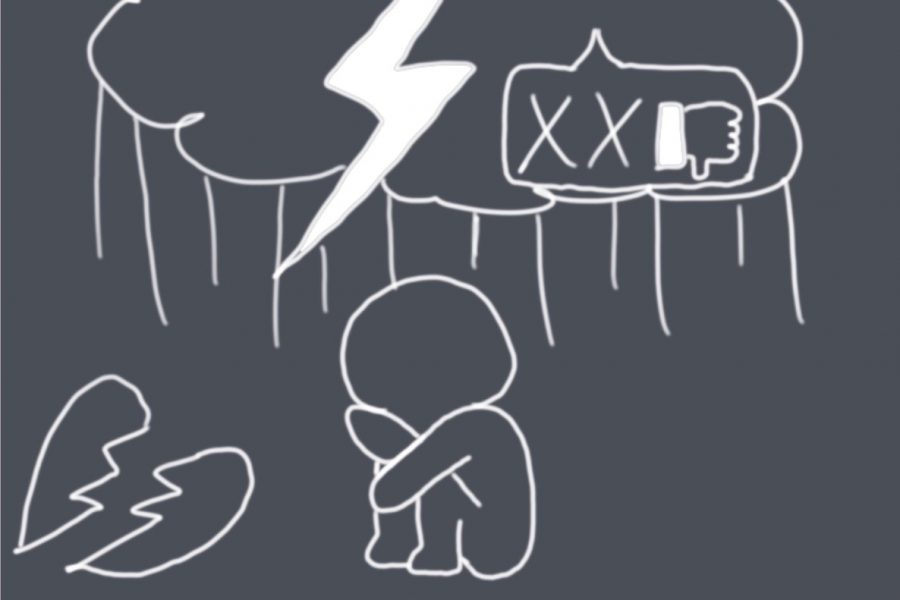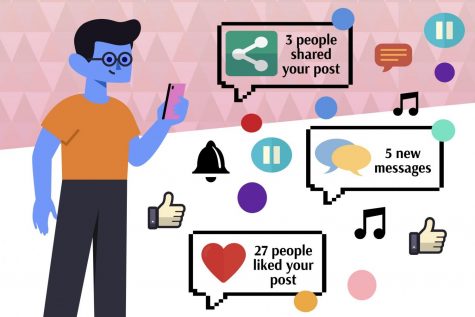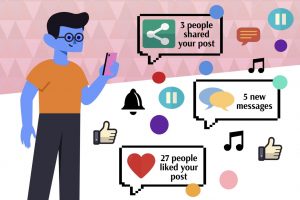Con: Social media is infecting us
How teenagers are abusing their screen time and why healthier changes must be made
Many teenagers use their phones to interact with others, and while there are the positives of having fun, social media can take a toll on their mental health. Many teenagers enjoy social media but it is a dangerous habit and negative thing.
September 24, 2020
The virus is ravaging millions.
No, not COVID-19. This virus is harder to spot and find symptoms. This disease is slowly eating away at us, and we are blind to it: social media. In the past decade, the creation and popularization of social media platforms has unknowingly started to affect our mental health in the worst way possible.
Young people are more likely to report poor mental health after heavy use of social media. As young people depend more and more on social media, studies show that they tend to have more anxiety and isolate themselves from other people.
Parents are swapping out stories for screens. Friends are swapping out talking for texting. The world is slowly swapping out real connections with virtual ones.
A prominent side effect of social media is cyberbullying. Some studies show that 15% of students ages 12-18 were bullied online. Exposing young people to this level of criticism and comparison is detrimental to their mental health. Introducing kids to social media early on only gives them more exposure to the negative impacts social media has.
“I experienced cyberbullying in sixth grade, and it caused me to take a break from social media for a while,” CHS senior Jordyn Morris said. “Now that I’m older, I know to put limits on myself, to spend less time on my phone, which makes me look at social media differently.”
During quarantine, millions of people started spending an unprecedented amount of time on their phones. The average adult spends about three and a half hours a day using their phones, but during quarantine, screen time increased by around 30% for most Americans.
Now, people are realizing that they have to limit the social media usage to make way for other things in life that are more important.
“I have to set limits for myself and plan out when I use it, so I view it more as a reward.” CHS senior Delase Ansah said. “We check our phones almost every minute of the day. While social media gives us a voice, it also needs to stop holding us back.”
In addition to all of these consequences, our physical health is affected too, through eye strain and craned necks. We live a life where we look down at the screen in front of us rather than at the world around us. Even when we choose to commemorate the world, we look at it through our screen while taking photos.
Our wellbeing is in danger.
Every minute spent scrolling on Instagram is another minute spent sinking further into the couch until you can not get up. We tap through the lives of other people rather than getting to know them ourselves, comparing ourselves and trying to understand why we cannot be perfect and “influencers” like everyone else on social media.
Social media gives us a false perception of the world we live in. Almost nothing that you see online is the real story. Social media is showing us only what we want to see. Instead of showing the world authenticity, we show a photoshopped version of ourselves. We never share what makes us human.
We are all puppets on social media, dancing around on strings, trying to play our role perfectly. We are one big planet pulled by strings in the hands of the online world.
For all the downfalls of social media, there are some benefits that have made life easier. Without social media, it would’ve been harder to connect with people during quarantine. Social media allows us to connect with people around the world, express ourselves through our posts, and find trends and fashions you like.
Spending time on social media is perfectly normal and fun, there just needs to be a healthy way to use it. In order to protect your mental health, set timers for yourself. Be intentional about getting on your phone. Spend more time outside. Set goals for less screen time that week. Social media is meant to be fun and a source of entertainment. If we let ourselves be in control instead of it controlling us, we may find ourselves happier and free.
We can no longer be sick with social media. We have to step back from our screen longer than we hide behind it. We diagnose ourselves, look at the symptoms and find the best treatment from there. Our cure is simple. Step back from social media, and realize that in the many ways it may help us, until we start developing healthier habits, it hurts us so much more.
Follow Blanche (@blanchegang) and @CHSCampusNews on Twitter.











